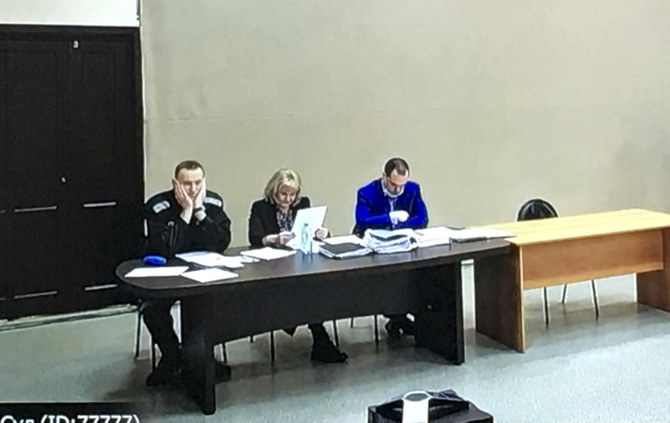MOSCOW: Russian prosecutors on Tuesday called for jailed Kremlin critic Alexei Navalny to serve 13 years in prison on new fraud charges.
Navalny, President Vladimir Putin’s most vocal domestic critic, was jailed last year after surviving a poison attack with Novichok nerve agent he blames on the Kremlin.
He now faces embezzlement and contempt of court charges and has been put on trial at the prison colony outside Moscow where he is already serving a 2.5 year sentence.
“I request that Navalny be sentenced to a term of 13 years and a subsequent two years of probation,” prosecutor Nadezhda Tikhonova was quoted as saying by Russian news agencies.
The prosecutor asked for Navalny to be sent to a “strict regime” penal colony, which would place him in much harsher conditions with cellmates who are repeat offenders.
The prosecutor also called for him to pay a fine of 1.2 million rubles ($10,600 or 9,500 euros).
“You can’t put everyone in prison. Even if you ask for 113 years, you won’t scare me or others like me,” Navalny said in court, his team wrote on social media.
The judge will issue a verdict on March 22.
It was not immediately clear whether the 13 years would include the sentence Navalny is currently serving.
Navalny spoke in court wearing his black prison uniform, with journalists watching via a video link.
The transmission constantly cut out during his final speech, Mediazona news site reported.
In a statement posted by supporters afterwards, Navalny said his speech focused on Russia’s military action in Ukraine, calling it a “bloody cover-up for the failure of Putin’s regime.”
“Every person must act. In their own way, as they can, considering the circumstances. But act,” Navalny said.
In court, he mentioned the “wonderful woman” Marina Ovsyannikova, who interrupted a state TV news broadcast on Monday holding up an anti-war poster.
He told supporters he was “totally OK” and “only worrying about the fact that others are worrying about me.”
A key Navalny aide and former head of his now outlawed regional offices, Leonid Volkov, said that Russia is seeking to keep Navalny jailed for life.
“He was sentenced to life from the very start. So long as Putin is still in the Kremlin,” Volkov said on Twitter.
Navalny’s spokeswoman Kira Yarmysh said his sentence depends on “how long Putin is in power.”
“Then we will do everything so that he doesn’t stay in power long,” Yarmysh said.
Investigators accuse Navalny of stealing for personal use several million dollars’ worth of donations that were given to his political organizations.
Before he was jailed, Navalny was Russia’s main opposition leader and his team frequently published investigations into the wealth of Russia’s elites that garnered millions of views on YouTube.
Navalny’s poisoning in 2020 with Novichok, a military-grade nerve agent, and arrest on his return from rehabilitation in Germany last year sparked widespread condemnation abroad as well as sanctions from Western capitals.
After his arrest, Navalny’s political organizations across the country were declared “extremist” and shut down, while many key aides fled Russia fearing prosecution.
Russia has also ramped up pressure on independent media and NGOs, with many declared foreign agents or shut down under fear of prosecution.
Russia has passed a new law introducing up to 15 years in jail for “fake news” about what Russia calls its military operation in Ukraine.
In an effort to further control the information available to its domestic audience, Russia this month restricted access to Twitter, Facebook and Instagram, and has blocked the websites of several independent news outlets.
On Instagram, Navalny has denounced the conflict and called on his supporters to protest despite the high likelihood of fines and arrest.
Over the past two weeks, close to 15,000 people have been detained at Ukraine demonstrations across Russia, according to independent monitor OVD-Info.
























